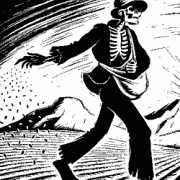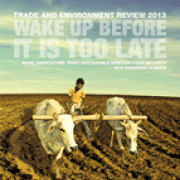Brazil Set to Unleash Terminator Threat
Submitted by Veronica Villa on
Today Brazil’s Judicial Commission is slated to rule on the constitutionality of a proposed bill that will allow genetically engineered sterility in seeds, known as Terminator Technology. If the bill gains the approval of the Commission, it could quickly come to a vote in Congress. Brazil’s national law to ban Terminator has been under threat since it was enacted 8 years ago, but this most recent congressional action has caused the most serious alarm since it could swiftly overturn the ban.
Preocupación porque el IPCC incluye la geoingeniería en su nuevo reporte global
Submitted by Joëlle Deschambault on
El Panel Intergubernamental de Expertos sobre el Cambio Climático publicó hoy la primer entrega de su más reciente Informe de Evaluación del cambio climático (AR5 por sus siglas en inglés) un informe que desde su primera versión ha dado la tónica de la discusión sobre este tema en la comunidad internacional.
News Release: Concern as IPCC Bangs the Drum for Geoengineering
Submitted by ETC Group on
As the Intergovernmental Panel on Climate Change published the first installment of its latest climate change Assessment Report, AR5, the final paragraph of its Summary for Policymakers – a bullet point referring to proposals for deliberately altering climate systems – has caused consternation by addressing the controversial topic of geoengineering. (1)While the paragraph does not endorse geoengineering, as had been proposed by Russia, its very presence is ringing alarm bells.
Encore un rapport de l'ONU qui appelle au soutien de l’agriculture paysanne et de l’agroécologie
Submitted by Joëlle Deschambault on
La Via Campesina, GRAIN et ETC saluent un nouveau rapport de la CNUCED qui déclare que l’agriculture, dans les pays riches comme dans les pays pauvres, devrait effectuer une transition des monocultures vers une plus grande diversité de cultures, une diminution de l'usage des engrais et autres intrants, un soutien renforcé aux petites structures agricoles, et une production et une consommation alimentaires plus axées sur le local. Plus de 60 experts internationaux ont contribué à ce rapport, publié la semaine dernière.
Yet another UN report calls for support to peasant farming and agroecology
Submitted by Veronica Villa on
La Via Campesina, GRAIN and ETC welcome a new UNCTAD report which states that farming in rich and poor nations alike should shift from monoculture towards greater varieties of crops, reduced use of fertilizers and other inputs, greater support for small-scale farmers, and more locally focused production and consumption of food.
Pages
Recent Blogs
Top Ten Seed Companies 2007
Submitted by Jim Thomas on
In a couple of days Hope Shand from ETC Group will be in court in the European patent Office to challenge Monsanto's Patent on Soy beans - a patent that we have been contesting for 13 years and that originally Monsanto themselves opposed!! You can read more about that here. In the meantime, ETC Group is releasing its new ranking of the world's top 10 seed companies, based on 2006 seed revenues. The list appears below.
5-4-3-2-1! GM Crop Countdown.
Submitted by Jim Thomas on
The biotech industry claims that the global area devoted to GM crops in 2005 was 90 million hectares - or 222 million acres. ETC Group does not endorse or agree with the validity of annual statistics on GM crops compiled by the International Service for the Acquisition of Agri-biotech Applications (ISAAA).
We agree with civil society critics who charge that ISAAA's statistics are inflated and unreliable. However, even using industry-generated statistics, the biotech countdown is revealing. Here are the vital statistics:
2006 and the plutocracy
Submitted by Silvia Ribeiro on
In this article the author makes a very enlightening summary of corporate concentration during 2006, and how this affects our lives as simple citizens even though we think its something happening far away by Silvia Ribeiro Corporate concentration through global mergers and acquisitions reached a record at the close of 2006.
FDA's Little Meeting
Submitted by Kathy Jo Wetter on
On October 10, ETC Group attended the US Food and Drug Administrations first public meeting on nanotechnology. About 40 people had signed up to make presentations, and we were each given eight minutes to say our piece to the FDAs newly-formed Nanotechnology Task Force. (You can read the text of ETC Groups presentation here.)
Nano-Drug's Dirty Little Secret
Submitted by Charlie on
Nano-Drug's Dirty Little Secret
Groups Demand Genetic Independence for Mexicos Maize
Submitted by Silvia Ribeiro on
On September 12 just days before Mexico celebrates its Independence Day ETC Group and several Mexican organizations held a press conference in Mexico City and declared the traditional Cry of Independence, but this time for the genetic independence of Mexican maize. It has been over five years since DNA from genetically modified maize contaminated native maize varieties in Mexico.
Synthetic Biology - New alcohol in old (corporate) bottles.
Submitted by Jim Thomas on
The Economist this week has a Special Report on Synthetic Biology , the new field of building artificial life forms from scratch. As is to be expected from the Economist, this is a fairly upbeat assesment of the technology that fails to mention the growing opposition to Synthetic Biology, signalled a few months ago when almost forty civil society groups, trade unions and scientific associations signed an open letter calling for caution.
Here at ETC we have been busy writing our own special report on Synthetic Biology (which we are calling 'Extreme Genetic Engineering' - watch this space!). You can expect it to be a bit more critical than the Economist.
El jardinero infiel
Submitted by Silvia Ribeiro on
By Silvia Ribeiro This article provides more information about the infamous case of two new experimental drugs derived from transgenic rice by Ventria Biosciences, tested without consent, on babies and children hospitalized at two pediatric institutes in Peru. The rice was genetically engineered with synthetic human genes to produce artificial human milk proteins. (Only spanish).
Babies as Guinea Pigs: Biotech company turns two Peruvian hospitals into laboratories
Submitted by Kathy Jo Wetter on
Silvia Ribeiro*
The biotech company Ventria Biosciences sponsored tests, on babies and children hospitalized at two pediatric institutes in Peru, of two new experimental drugs derived from transgenic rice that was genetically engineered with synthetic human genes to produce artificial human milk proteins.
The Science of Bioethics
Submitted by Kathy Jo Wetter on
We've just read the article, "Lessons on Ethical Decision Making from the Bioscience Industry" - this is not a joke - which appeared in the May issue of PLoS Medicine and is available on the Internet. The authors are Jocelyn E. Mackie, Andrew D. Taylor, David L. Finegold, Abdallah S. Daar and Peter A. Singer. Four of the five authors are at the University of Toronto Joint Centre for Bioethics.



